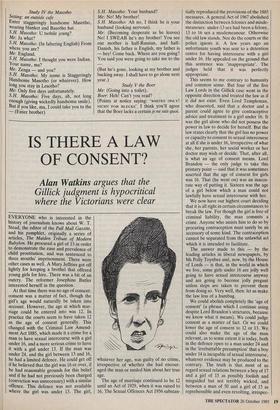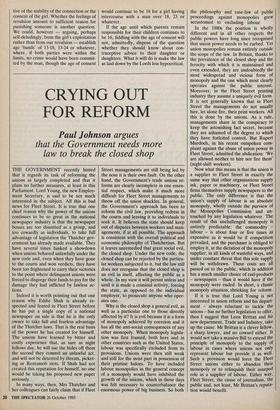IS THERE A LAW OF CONSENT?
Alan Watkins argues that the
Gillick judgment is hypocritical where the Victorians were clear
EVERYONE who is interested in the history of journalism knows about W. T. Stead, the editor of the Pall Mall Gazette, and his pamphlet, originally a series of articles, The Maiden Tribute of Modern Babylon. He procured a girl of 13 in order to demonstrate the ease and prevalence of child prostitution, and was sentenced to three months' imprisonment. There were other cases as well. A Mary Jeffries got off lightly for keeping a brothel that offered young girls for hire. There was a bit of an outcry. The reformer Josephine Butler interested herself in the question.
At that time there was no age of consent: consent was a matter of fact, though the girl's age would naturally be taken into account. However, the age at which mar- riage could be entered into was 12. In practice the courts seem to have taken 12 as the age of consent generally. This changed with the Criminal Law Amend- ment Act 1885, which made it a crime for a man to have sexual intercourse with a girl under 16, and a more serious crime to have it with a girl under 13. If the man was under 24, and the girl between 13 and 16, he had a limited defence. He could get off if he believed that the girl was 16 or over, if he had reasonable grounds for this belief and if he had not previously been charged (conviction was unnecessary) with a similar offence. This defence was not available where the girl was under 13. The girl, whatever her age, was guilty of no crime, irrespective of whether she had encour- aged the man or misled him about her true age.
The age of marriage continued to be 12 until an Act of 1929, when it was raised to 16. The Sexual Offences Act 1956 substan- tially reproduced the provisions of the 1885 measures. A general Act of 1967 abolished the distinction between felonies and misde- meanours: under-13 sex had been a felony, 13 to 16 sex a misdemeanour. Otherwise the old law stands. Nor do the courts or the police. ignore it. A few years ago an unfortunate youth was sent to a detention centre for having intercourse with a girl under 16. He appealed on the ground that this sentence was 'inappropriate'. The judges held that it was perfectly appropriate.
This seems to me contrary to humanity and common sense. But four of the five Law Lords in the Gillick case went in the opposite direction and treated the law as if it did not exist. Even Lord Templeman, who dissented, said that a doctor and a parent could agree to give contraceptive advice and treatment to a girl under 16. It was the girl alone who did not possess the power in law to decide for herself. But the law states clearly that the girl has no power or capacity to consent to sexual intercourse at all if she is under 16, irrespective of what she, her parents, her social worker or her doctor may wish or decide. That, after all, is what an age of consent means. Lord Brandon — the only judge to take this primary point — said that it was sometimes asserted that the age of consent for girls was 16. That (he went on) was an inaccu- rate way of putting it. Sixteen was the age of a girl below which a man could not lawfully have sexual intercourse with her.
We now have our highest court deciding that it is all right in certain circumstances to break the law. For though the girl is free of criminal liability, the man commits a crime. Anyone who assists him to do so by procuring contraception must surely be an accessory of some kind. The contraception cannot be separated from the unlawful act which it is intended to facilitate.
The answer made to this — by the leading articles in liberal newspapers, by Ms Polly Toynbee and, now, by the House of Lords — is that, in the world in which we live, some girls under 16 are jolly well going to have sexual intercourse anyway and are going to become jolly pregant unless steps are taken to prevent them from doing so. Very well, then: let us make the law less of a humbug.
We could abolish completely the 'age of consent' (a phrase which I continue using despite Lord Brandon's strictures, because we know what it means). We could judge consent as a matter of fact. Or we could lower the age of consent to 12 or 13. We could also make the age of the man relevant, as to some extent it is today, both in the defence open to a man under 24 and in the irrebuttable presumption' that a boy under 14 is incapable of sexual intercourse, whatever evidence may be produced to the contrary. The truth is that most of us regard sexual relations between a boy of 17 and a girl of 15 as possibly foolish and misguided but not terribly wicked, and between a man of 50 and a girl of 15 as reprehensible and even revolting, irrespec- tive of the stability of the connection or the consent of the girl. Whether the feelings of revulsion amount to sufficient reason for punishing someone is another question. We could, however — arguing, perhaps self-deludingly, from the girl's exploitation rather than from our revulsion — establish age 'bands' of 13-18, 13-24 or whatever, where, if both parties were within the limits, no crime would have been commit- ted by the man, though the age of consent would continue to be 16 for a girl having intercourse with a man over 18, 23 or whatever.
If the age until which parents remain responsible for their children continues to be 16, fiddling with the age of consent will not, admittedly, dispose of the question whether they should know about con- traceptive advice to their daughter or daughters. What it will do is make the law as laid down by the Lords less hypocritical.



























































 Previous page
Previous page